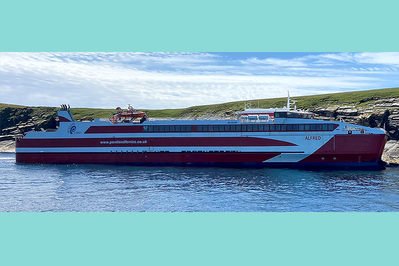Fatigue Led to Grounding of RoRo Ferry
The UK Marine Accident Investigation Branch (MAIB) has published its report into the grounding of the ro-ro ferry Alfred on July 5, 2022.
The ferry grounded on the east coast of Swona Island, Pentland Firth, Scotland. The impact caused injuries to 41 passengers and crew and damage to Alfred’s port bulbous bow and almost all the vehicles being transported on board. The vessel subsequently refloated on the rising tide and continued to St Margaret’s Hope under its own power later that afternoon. There was no pollution, but the vessel was withdrawn from service for repairs.
The investigation found that Alfred grounded because the master experienced a loss of awareness while helming the vessel close inshore, almost certainly as a result of falling asleep for approximately 70 seconds. During this period the master allowed Alfred’s heading to swing towards the coast unchecked. When the master became aware of the vessel’s predicament, he was unable to prevent the ferry striking the rocks at 13 knots.
The investigation also identified that Alfred’s passage plan was inadequate and that its ECDIS, which was the ferry’s primary means of navigation, was not being used effectively to support safe navigation and warn of danger.
Despite the passage plan being in place since the vessel entered service in 2019, neither the Pentland Ferries’ annual audits nor the Maritime and Coastguard Agency’s surveys had detected this safety issue.
Alfred grounded in waters controlled by Orkney Islands Council Harbour Authority. However, the harbour’s vessel traffic service was not monitoring the movement of the ferry and did not raise the alarm when it entered the guard zone around Swona Island. Once aground, Alfred’s emergency response did not follow the safety video shown to passengers before departure from port. The investigation established that this was because the vessel’s procedures and weekly drills had not adequately prepared the crew for the emergency. The investigation also found that the Pentland Ferries emergency response team ashore did not prompt the master to create a nominal list of those on board.
Pentland Ferries has taken significant action to enhance its procedures and ensure that they are followed; implemented a fatigue management plan; strengthened its emergency response procedures; and, enhanced the training provided to crew and shore staff.
The Orkney Islands Council Harbour Authority has taken action to improve its oversight of ferry operations in its waters.
Recommendations have been made to the Maritime and Coastguard Agency to: direct its surveyors to ensure that vessel passage plans are available; issue guidance to the UK domestic passenger fleet on the securing of heavy objects on board their vessels; and, to review the general exemption from the requirement for these vessels to be fitted with voyage data recorders. Pentland Ferries has been recommended to review its emergency response team procedures to ensure that it captures passenger details and injuries post-accident.















